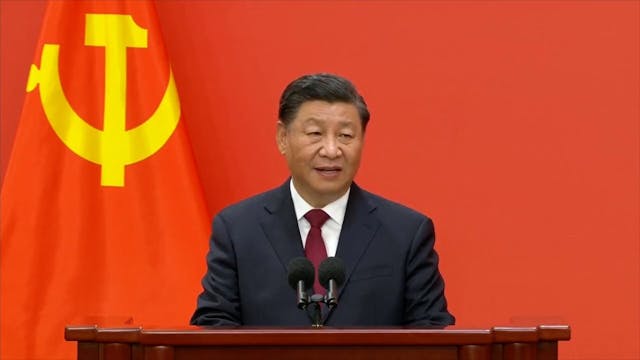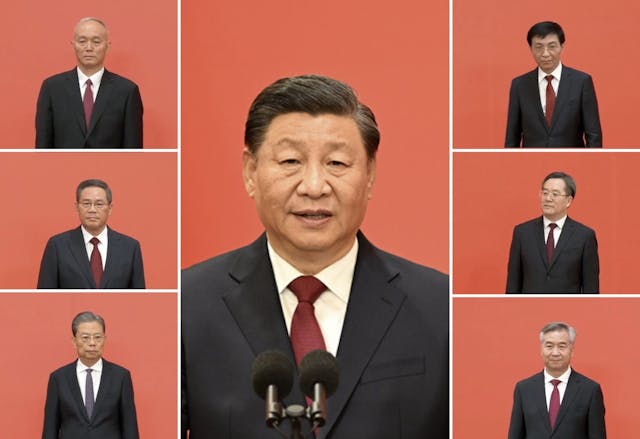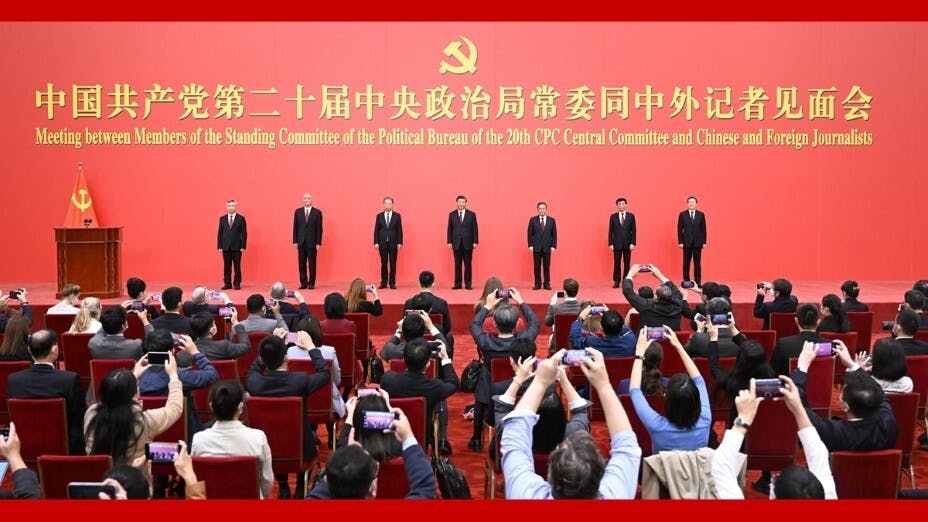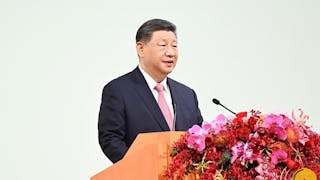10月22日的中共二十大通過的《中國共產黨章程(修正案)》和23日公布新的政治局常委人事安排,不僅對未來幾年中國的政治經濟發展,而且對香港和澳門的政治發展,以至北京與台北的關係都有直接的影響。
意識形態合法化
首先,中國共產黨黨章修正案具有重大的意識形態法理性,對黨的發展和領導、社會主義民主、強軍事業發展和中國從現在到2035年以後的發展戰略具有重要意義。預計到時國家將成為「富強、民主、文明、和諧、美麗」的強國。
在意識形態合法性方面,修正案強調馬克思主義中國化,將「習近平新時代中國特色社會主義思想」確立為黨必須長期堅持的指導思想並寫入黨章。與中共十八大將「科學發展觀」作為黨的指導思想和黨的十九大將「中國共產黨在社會主義初級階段的基本路線」寫入黨章;中共二十大對黨章的修改明確高舉「習近平新時代中國式社會主義」的旗幟。信息非常明確──社會主義正在以非常中國式的方式推進,習近平的領導和社會主義思想得到高度重視,並在意識形態上得到合法性。在中國仍然是中國共產黨領導下的社會主義強國的情況下,這份強調習近平新時代社會主義思想思想合法性的黨章修正案,正為中國從實現第一個百年奮鬥目標邁向下一個百年奮鬥目標的政治發展奠定基礎,其基本信息是確保中國共產黨在未來幾十年的長治久安。
在意識形態合法化方面,修正案強調馬克思主義中國化,將「習近平新時代中國特色社會主義思想」寫入黨章。因此,修正案中強調中共的貢獻,包括黨的「百年奮鬥重大成就和歷史經驗」,以及通過中國共產黨推動「中國式現代化」和「民族復興」的任務。「公有制為主體、多種所有制經濟共同發展」──以社會主義為主與市場化手段相結合的混合經濟,雖然在黨章修正案中根本沒有使用「資本主義」的字眼。相反,修憲的起草人巧妙地使用了「國內國際雙循環」的說法,以促進中國經濟的高質量發展、效率和可持續性。黨章修正案用詞的選擇非常巧妙和深思熟慮,目的是強調在中國經濟發展中以社會主義為主與市場化相結合。
與中共十八大、十九大修正案不同的是,本屆黨的二十大修正案前所未有地強調了「政治」、「革命」、「科技」、「世界一流」的軍隊建設。 「人才」、「依法治軍」,最重要的是「堅決反對和遏制台獨」。同時,中共提倡「和平、發展、公平、正義、民主、自由和人類共同價值觀」。10月16日,中共中央總書記習近平在二十大報告中指出,軍隊要繼續改革,為實現「祖國完全統一」的任務做好準備,盡最大努力爭取和平統一的前景,但如果和平手段用盡,北京因此強調絕不承諾放棄使用武力,保留採取一切必要措施的選項。因此,中國需要一支強大的軍隊來保護自己的主權、國家安全和「祖國完全統一」。

中國的發展戰略
習近平講話對美國和台灣的信息非常明確:少數台灣「分裂分子」將不得不重新考慮他們的態度和戰略,美國任何干涉中國內政的行為實際上被警告。習近平在10月16日向中共二十大提交的報告呼應8月發表的對台灣白皮書重要內容,這是在佩洛西訪問台北後不久發表的。白皮書不再提及統一後中國軍隊不會駐台,而是提出如果台方接受九二共識,則與台灣分階段進行談判。綜合二十大關於台灣的政治信息,北京現在對台灣的立場非常明確──和平解決台灣問題是優先事項,分階段談判模式則是一國兩制的台灣版。如果台方接受九二共識,將推動「兩制」,而武力達至與台灣「完全統一」將是最後的手段。可以預見,習近平第三任中共總書記的任期將可能見證北京方面在解決台灣問題上的更多姿態,因為中共二十大報告強調,中國必須在處理台灣政治前途上發揮主導作用。
對內方面,修改後的黨章強調中共要進行「自我革命」,這是一個關鍵詞,即黨要不斷更新換代、長期執政、反腐倡廉、鞏固基層。黨員要負起加強縣、村、社區乃至醫院各級黨支部的責任。黨派巡視組檢查幹部黨員幹部工作,反腐是持之以恆、從嚴治黨,增強全體黨員的危機意識的必由之路。正如習近平的報告所明確指出的那樣,反腐要以「得罪千百人、不負十四億」的使命擔當。這是一個明確的信息,即反腐是中共去痾治亂、長期執政、持續自我革命和合法化的必要條件 。
10月16日,中共總書記習近平在大會報告中發表了強有力的講話,非常清晰地描繪了中國的發展戰略。中國仍然是一個非常強大的國家,致力於實現可持續發展、經濟現代化、社會扶貧,最重要的是大國外交。10月黨的決議強調實現「和平、發展、公平、正義、民主、自由等人類共同價值觀、開放包容、清潔美麗的世界」的目標可以看作是對世界各國的信息──中國是一個致力於平等、可持續發展和民主自由的共同價值觀的和平國家。
然而,正如10月16日的報告所指出的那樣,中國也反對霸權主義、保護主義和單邊主義,這意味中共拒絕任何國家將自己的價值觀普遍和單方面地強加給其他國家,更不用說全球了。顯然,向西方世界傳達的信息是,世界是由不同文化和國家的不同價值觀組成的,拒絕以將一套特定價值觀強加於中國和其他國家的霸權主義形式。事實上,中國一直奉行自由主義的對外政策,強調多邊主義、國際關係平等和不干涉別國內政。
香港和澳門的信息
10月16日向大會提交的報告中有關香港和澳門的信息是明確的。報告的前半部分強調,中央政府必須通過實施「全面管治」和確保「愛國者治港」來應對香港的混亂局面。結果使香港「從亂到治」──習近平在2022年7月1日訪問這座城市時已經強調了這一點。報告的中間部分提到了澳門,稱香港和澳門都必須通過實現港人治港、澳人治澳的原則來保持長期穩定和發展。報告最後部分要求港澳「發展經濟、改善民生,破解經濟社會發展過程中的深層次矛盾和問題」,同時鼓勵兩個特別行政區「更好地融入國家發展大局」和「在實現中華民族偉大復興中作出貢獻」。
報告要求港澳政府策略性地處理與內地特別是粵港澳大灣區的經濟一體化,解決經濟社會深層次矛盾。10月19日,香港行政長官李家超首次發表《施政報告》,提出解決增加公屋供應、徵地建屋等緊迫民生問題,是中國國家規劃的正確方向戰略。顯然,在對外國人和香港遊客入境限制過嚴的情況下,澳門也將不得不做同樣的事情。當然,在10月16日二十大召開的前幾天,內地傳媒曾斷言有必要保留「動態清零」政策。鑑於澳門順從內地反疫情政策的性質,需要一段時間來設想澳門政府對外國和香港遊客的入境採取更加開放的政策。
二十大的人事變動
整個二十大的高潮是10月23日的7位政治局常委全體亮相。李克強(67歲)、栗戰書(72歲)、汪洋(67歲)和韓正(68歲)被排除在10月22日公布的中央委員會名單外,這意味着他們將退下。接替他們的是李強(63歲,香港理工大學高級管理人員工商管理碩士,在浙江和上海工作經驗豐富)、蔡奇(67歲,曾在福建、北京和國安委員會工作,經驗豐富)、丁薛祥(60歲,有豐富的工程經驗,曾在北京、上海、中央辦公廳工作過)、李希(66歲,清華大學管理學碩士,遼寧、廣東工作經驗豐富)。李強、蔡奇和丁薛祥在職業生涯中曾與習近平共事過一段時間,因此被視為習近平的親信。2022年年中,作為上海市委書記的李強在遏制Omicron擴散方面成績相當不錯。他很可能接替李克強成為下一任國務院總理。然而,考慮到政治局新成員的年齡特徵,從長遠來看,最年輕的丁薛祥很可能會成為接替習近平的中國最高領導人之一。
事實上,68歲退休的年齡劃界並未嚴格執行,按需要、個人意願和個人能力而定。69歲的習近平繼續擔任中共總書記,確保他對黨和國家的「核心領導」──這是黨章修正案規定的,也是可以追溯到前總書記江澤民的實踐──他為繼任的胡錦濤提供了「江核心」。習近平作為黨總書記、國家主席和中央軍委主席的三位一體,確保了中國共產黨統治下的第一個100年到第二個100年的穩定領導和成功過渡。
同樣,張又俠(72歲)仍然在中央軍委,仍然是排名第二的領導人。他是1979年中越戰爭和1984年中越衝突老山戰役的老兵。他的經驗顯然對中國應對任何可能出動軍隊保衛國家甚至實現「祖國完全統一」的突發事件具有重要意義。
此外,3名管理香港事務的官員也沒有出現在中央名單上:除了中央港澳工作協調小組組長韓正和國務院港辦主任夏寶龍(70歲)之外,中央委員名單中也沒有中聯辦主任駱惠寧(68歲)。人事變動是不可避免的,因為其中3人至少達到68歲──這是官員下台的常規年齡。無論誰接替他們處理港澳事務,都不會改變北京對兩個特別行政區已經確定的、明確的政策。

總之,新一批較年輕的中國領導人已經在黨中央就位,他們將繼續在發展強國、戰略目標明確的中華民族復興道路上繼續努力奮鬥。意識形態正當性在黨的二十大報告的撰寫方式和黨章的修改方式中表現得十分明顯。中國共產黨正在通過體現馬克思主義的進程為中華民族的復興提供必要的領導力,同時使習近平新時代的社會主義思想牢牢紮根於修改後的中國共產黨章程中。強軍仍然是中國發展的主題,而經濟發展和改革仍然是務實的。中國式社會主義思想與經濟實用主義和大國外交的結合,在黨的代表大會報告及其相關的中共憲法修正案中表現得十分明顯。習近平總書記以全黨核心領導力和新一批政治局常委開啟了中國共產黨第二個100年奮鬥的新篇章,延續中國的大國外交和實現國家完全統一的目標。台灣顯然正在成為這個「完全統一」進程的下一個目標,而北京對香港和澳門的政策已經明確,無論處理港澳事務的高層領導即將發生變化。一個強大而成功的中國共產黨的形象和現實,是具有里程碑意義的中共二十大的鮮明成果。
China’s 20th Party Congress, Constitutional Amendments and Personnel Change: Implications for the Mainland, Hong Kong, Macau and Taiwan
The amendments made to the constitution of the Communist Party of China (CPC) on October 22 and the new personnel arrangements of the Politburo Standing Committee (PSC) have immediate implications for not only China’s politico-economic development in the coming years but also the politics of Hong Kong and Macau as well as Beijing-Taipei relations in the immediate future.
First and foremost, the amendments passed to the CPC constitution contain significant ideological legitimization with significant meanings to the party’s development and leadership, its socialist democracy, the military’s self-strengthening movement, and China’s developmental strategy from now to the years beyond 2035, when it will be expected that the country will become “affluent, democratic, civilized, harmonious and beautiful, and strong.”
In terms of ideological legitimization, the amendments emphasize the Sinification of Marxism and the insertion of “Chinese-style socialist thought and development in Xi Jinping’s new era” into the CPC constitution. Compared with the 18th Party Congress which incorporated “scientific development” as the Party’s guiding thought and the 19th Party Congress that “adapted the content of the preliminary stage of socialism” to the Party constitution, the amendments made to the Party constitution during this 20th Party Congress explicitly raises the banner of “Chinese-style socialism” in “Xi Jinping’s new era.” The message is very clear: socialism is proceeding in a very Sinified way and Xi Jinping’s leadership and socialist thought are heavily emphasized and ideologically legitimized. As China remains a strong socialist state under the leadership of the CPC, the current amendment that stresses ideological legitimacy of Xi Jinping’s new era socialist thought is laying down the foundation of political development of China from the first one hundred years to the next one hundred years. The underlying message is to ensure the longevity of the CPC in the coming decades.
As such, the contributions of the Party have been emphasized in the Party constitutional amendment, including its “great achievements and historical experiences,” and embracing its task of promoting “Chinese-style modernization” and the “Chinese renaissance” through “the main entity of public ownership” with “multiple ownerships in economic mutual development” – a mixed economy with mainly socialist features combined with marketized means, although the word “capitalist” is not used at all in the party amendments. Instead, the drafters of the amended constitution skillfully used the term “domestic and international double circulation” to promote China’s high-quality development, economic efficiency and sustainability. The choice of terms and words in the Party amendment was very skillful and deliberate with the objective of emphasizing the utilization of mainly socialist combined with marketization in China’s economic development.
Unlike the Party amendments in the 18th and 19th Party Congresses, the amendments in this 20th Party Congress unprecedently emphasize how the military can be established as “first class in the world” by emphasizing “politics,” “revolution,” “scientific technology,” “talents,” “the rule of military by law,” and most importantly the “resolute opposition to and curb on ‘Taiwan independence.’” At the same time, China promotes “peace, development, fairness, justice, democracy, freedom and the common values of the mankind.” The messages are very clear again: the military has to continue to reform itself to prepare for its task of achieving “complete reunification,” as CPC General Secretary Xi Jinping’s report of the Party Congress said on October 16. At the same time, China attaches priority to a peaceful resolution to deal with Taiwan’s political future, but if peaceful means are exhausted, Beijing therefore cannot renounce the use of force to cope with Taipei. Therefore, a strong military for China to protect its sovereignty, national security and “complete reunification” is and will be necessary.
The messages to Taiwan, and the US, are very clear: a minority of Taiwan “separatists” will have to reconsider their attitude and strategy, and the US is actually warned of any intervention in China’s domestic affairs. The report delivered by Xi Jinping to the 20th Party Congress on October 16 stroke an important chord with the content of the new White Paper on Taiwan published in August, shortly after the provocative Nancy Pelosi visit to Taipei. The White Paper no longer mentioned that the Chinese military would not be stationed in Taiwan after reunification, but it proposed a stage-by-stage process of negotiations with Taiwan if the Taiwan side accepts the 1992 consensus. Taken together the political messages on Taiwan during the 20th Party Congress, Beijing’s position on Taiwan is now very clear – peaceful resolution of the Taiwan issue is a priority, stage-by-stage negotiations over the content of the Taiwan model of “one country, two systems” will be promoted if the Taiwan side accepts the 1992 consensus, but military force to deal with the “complete reunification” with Taiwan will be the last resort. It can be anticipated Xi Jinping’s third term of office as CPC General Secretary will likely witness more gestures from the Beijing side to settle the Taiwan question, as the report to the 20th Party Congress has stressed that China must take the leading initiative in dealing with Taiwan’s political future.
Internally, the amendments made to the Party constitution emphasize the need for the CPC to engage in “self-revolution” – a key word referring to the need for Party’s permanent renewal, ensured longevity, continuous anti-corruption campaigns, and incessant grassroots-level consolidation. CPC members must shoulder the responsibility of strengthening the Party cells in the county, village, community and even hospital levels While CPC sends inspection teams to check the performance of cadres and party officials, anti-corruption is a must to ensure the longevity and enhance the crisis consciousness of all Party members. As Xi’s report put it clearly, anti-corruption campaigns are a conscientious move to all Chinese citizens even though thousands of corrupt Party members have been antagonized – a clear message that anti-corruption a sine qua non for the Party’s rejuvenation, permanent survival and continuous self-revolution and self-legitimization.
CPC General Secretary Xi Jinping delivered a powerful speech in his report to the Congress on October 16 – a report that mapped out China’s developmental strategies very clearly. China remains a very strong state committed to achieving sustainable development, economic modernization, social poverty alleviation and most importantly a great power diplomacy. The Party resolutions on October emphasized the objectives of achieving “peace, development, fairness, justice, democracy and freedom as the common values of the mankind, openness and tolerance, and clean and beautiful world” can be seen as messages to countries in the world that China is a peaceful country committed to equality, sustainability and the common values of democracy and freedom.
However, as the October 16 report indicated, China also objected to hegemonism, protectionism and unilateralism, implying that it rejects any country to impose its values universally and unilaterally on other countries, not to mention the world. Clearly, the message to the Western world is that the world is composed of different values in varying cultures and countries, and that hegemony in the form of imposing a particular set of values onto China and other countries is rejected. As a matter of fact, China has been adopting a liberal external policy emphasizing multilateralism, equality in international relations and non-interference in other countries’ domestic affairs.
The messages on Hong Kong and Macau in the report delivered to the Congress on October 16 are clear. The early part of the report stressed that the central government had to respond to the chaos in Hong Kong by implementing its “comprehensive jurisdiction” and ensuring “patriots governing Hong Kong.” The result is to turn Hong Kong from “chaos to governance” – a point already stressed by President Xi on July 1, 2022 when he visited the city. In the middle part of the report, Macau was mentioned, saying that both Hong Kong and Macau must maintain long-term stability and development through the realization of the principles of “Hong Kong people ruling Hong Kong” and “Macau people ruling Macau.” In the last part of the report, Hong Kong and Macau are asked to “develop the economy, improve livelihood, and solve the deep contradictions and problems in the process of economic and social development,” while encouraging both cities to “better integrate into the national development” and to “function better in the process of realizing the Chinese renaissance.”
Hong Kong and Macau governments are asked to deal with economic integration with the mainland, especially the Greater Bay Area, in a strategic manner, and to address deep contradictions in the economy and society. In Hong Kong, Chief Executive John Lee has delivered his first policy address on October 19, addressing the urgent livelihood issues of increasing the supply of public housing units and acquiring more land for housing construction – a move in the right direction along the Chinese national planning strategy. Obviously, Macau will have to do the same thing amid excessively tight restriction on entry from foreigners and Hong Kong visitors. Of course, several days before the Party Congress convened on October 16, the mainland media had asserted the necessity of retaining the “dynamic zero-Covid policy.” Given Macau’s nature of being obedient to the mainland’s anti-Covid policy, it will take some time to envisage a more open-door policy to be adopted by the Macau government toward the entry of foreign and Hong Kong visitors.
The apex of the entire 20th Party Congress was the revelation of the seven members of the PSC on October 23. Premier Le Keqiang (67 years old), Li Zhanshu (72), Wang Yang (67) and Han Zheng (68) were excluded from the list of the Central Committee on its list published on October 22, meaning that they would step down. Their replacement in the PSC are Li Qiang (63 years old with a master degree in business management from Hong Kong Polytechnic University and with rich experiences in Zhejiang and Shanghai), Cai Qi (67 years old with rich experiences in Fujian, Beijing and National Security Commission), Ding Xuexiang (60 years old with rich experiences in engineering, Beijing, Shanghai and CPC General Office), and Li Xi (66 years with a master degree in management from Tsinghua University and rich experiences in Liaoning and Guangdong). Li Qiang, Cai Qi and Ding Xuexiang worked with Xi Jinping for some time in their careers, thereby regarding as Xi’s proteges. Li Qiang as a Shanghai party secretary did quite well in containing the spread of Omicron in mid-2022. He is likely to take over from Li Keqiang as the next Chinese premier. Yet, given the age profile of the new PSC members, it is likely that the youngest Ding Xuexiang would be one of the top Chinese leaders succeeding Xi Jinping in the long run.
The conventional rule of retiring at 68 has not been strictly implemented, depending on the needs, personal wishes and personal capabilities. Xi Jinping at the age of sixty-nine is continuing as the CPC General Secretary, ensuring his “core leadership” of the whole Party and the country – an affirmation made in the Party constitutional amendment and a practice that can be traced back to Jiang Zemin who also provided a core leader to his successor Hu Jintao. Xi’s trinity of positions as the Party Secretary, President and Chair of the Central Military Commission (CMC) ensures a stable leadership and successful transition of China under CPC rule from its first one hundred years to the second one hundred years.
Similarly, Zhang Youxia (72) is still in the CMC and remains the second ranked leader. He is a veteran of the 1979 Sino-Vietnamese war and the 1984 Sino-Vietnamese conflict in the battle of Laoshan. His experiences are clearly significant for China to deal with any contingency scenario in which the military would be deployed to defend the country and even to achieve “complete reunification.”
Furthermore, three officials managing Hong Kong affairs are not seen in the list of the Central Committee: apart from Han Zheng who is the chair of the Hong Kong and Macau Coordination Committee, Xia Baolong (70), the director of the Hong Kong and Macau Affairs Office and Luo Huining (68) are also absent in the list of Central Committee members. Personnel changes are inevitable as three of them reach at least 68 – the conventional age for officials to step down. Whoever will take over from them in handling Hong Kong and Macau affairs will not change Beijing’s already fixed and clear policy toward the two special administrative regions.
In conclusion, a new batch of younger Chinese leaders is in place in the CPC PSC and they will continue to work diligently for the path of achieving Chinese renaissance with a strong developmental state and clear strategic objectives. Ideological legitimization has been obvious in the ways in which the report to the 20th Party Congress was written and in which the CPC constitution was amended. The CPC is providing the necessary leadership for China’s renaissance with the process of signifying Marxism, while making the Xi Jinping’s new era of socialist thought entrenched firmly into the amended CPC constitution. Strong military continues to be a theme of China’s development, whereas economic development and reforms remain pragmatic. The mix of Chinese-style socialist ideology with economic pragmatism and great power diplomacy is apparent in the Party Congress report and its related CPC constitutional amendments. General Secretary Xi Jinping is providing the core leadership of the whole Party and PSC in opening the chapter for the CPC’s second one hundred years, continuing with China’s great power diplomacy and objective of achieving “complete reunification.” Taiwan is clearly becoming the next target of this process of “complete reunification,” while Beijing’s policy toward Hong Kong and Macau has been fixed clearly regardless of imminent changes in the top personnel handling Hong Kong and Macau affairs. The image and reality of a strong and successful CPC are clear outcomes from the landmark 20th Party Congress.




































